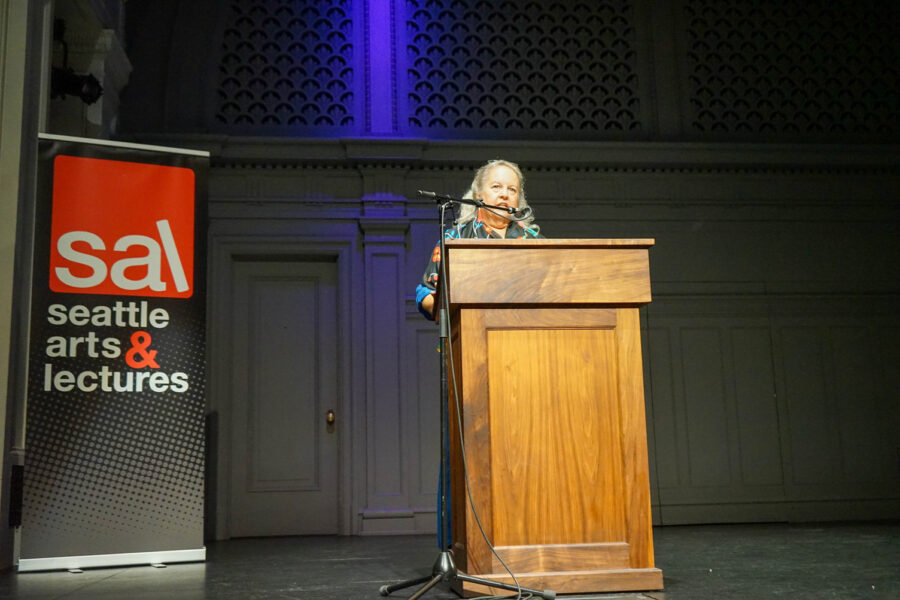Robin Wall Kimmerer, Author of Braiding Sweetgrass, Praises United Way of King County’s Work
In the wooden pews of Seattle’s Town Hall, audience members sat breathless and reverent, clinging to every melodic word Robin Wall Kimmerer said during her Encore Performance with Seattle Arts & Lectures last Monday, hosted in partnership with United Way.
“That pine tree is no more of an individual than I am,” Kimmerer began, speaking of the delicate web of carbon, microbes, and minerals that link us all. “We are all part of the great, green we.”
Kimmerer, the New York Times Best Selling author of Braiding Sweetgrass, spent Monday evening teaching Seattleites about the economy—each time whispering the word playfully like it was too dangerous to be spoken aloud. It’s doubtful that many in the audience expected Kimmerer—an ecologist and celebrated Indigenous author—to give a crash course on economics, but she did.

She explained that market economies thrive on scarcity mindsets built upon supply and demand, but the natural world undoubtedly exchanges its wealth through a gift economy. From trees producing berries for birds to enjoy and birds spreading seeds so the trees live on, the examples of reciprocity are abundant.
Kimmerer explores this theme in her new book, The Serviceberry: Abundance and Reciprocity in the Natural World, which came out in November.
“In the Western worldview, humans are apart from nature, and we often think of ourselves as perched atop this fictional pyramid of human exceptionalism,” Kimmerer said. She had the audience breathe deeply and think about the trees that create the oxygen that keeps us alive.
“Who’s at the top of the pyramid now,” she asked, urging the audience to question the imaginary line we draw between nature and self.
Like the Free Little Library system, Kimmerer explained that we can operate in an abundance mindset that values sharing. We can think of the world as a gift—not simply a commodity to be owned or exploited. Through reciprocity, or a gift economy, we can all benefit.

When asked how to move forward in the face of America’s current political climate and the election results, Kimmerer paused.
“The antidote is to continue to do the work that matters,” Kimmerer said. “That’s the resistance.”
“Cities can be a hotbed of innovation, and I think of the power of cities to create mutual aid societies and gift economies, including many of the things that I hear United Way and others are doing in your community,” Kimmerer continued.
United Way of King County partnered with SAL to bring Kimmerer to Seattle because our three values align closely, weaving together to create the beautiful environment that graced Town Hall last week.
SAL uplifts language in order to revitalize equity, justice, and belonging. Kimmerer shares stories to remind us that we’re not alone; we’re a part of this world. And United Way works with community to build a more just, compassionate, and equitable King County.
“This is our second year in collaboration with SAL, and as far as I’m concerned, we need to make that a tradition,” said Gordon McHenry, Jr., United Way’s President and CEO, when he kicked off the evening’s talk.
United Way’s partner, Red Eagle Soaring, also opened for Kimmerer and spoke about their commitment to supporting local Indigenous youth by connecting them to theatre, storytelling, and culture. Red Eagle Soaring is part of United Way’s Indigenous Communities Fund, a fund to support 10 Indigenous nonprofits in King County.
If you’re interested in donating to United Way’s Indigenous Communities Fund, you can learn more here.
We at United Way are grateful to SAL and Robin Wall Kimmerer for their insight and collaboration for Monday’s event.


Comments